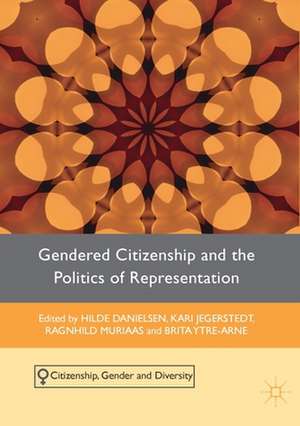Gendered Citizenship and the Politics of Representation: Citizenship, Gender and Diversity
Autor Brita Ytre-Arne Editat de Hilde Danielsen Autor Kari Jegerstedt Editat de Ragnhild L. Muriaasen Limba Engleză Paperback – 26 aug 2019
This book sheds new light on gender-based inequalities in a globalized world. Interdisciplinary in scope, it reveals new avenues of research on gendered citizenship, analysing the possibilities and pitfalls of being represented and of representing someone. Drawing on contexts both historical and contemporary, it queries what it means to have access to representation, which power structures regulate and produce representation, and who counts as a citizen. Situating its arguments in the global struggle for hegemony, it answers such thought-provoking questions as whether one can represent someone or be represented without recourse to citizenship and, conversely, whether it is possible to be a citizen if one does not have access to representation. This engaging edited collection will appeal to students and scholars of sociology, social anthropology, history, media studies, political science, literature, gender studies and cultural studies.
div>
Preț: 215.92 lei
Nou
Puncte Express: 324
Preț estimativ în valută:
41.32€ • 42.89$ • 34.46£
41.32€ • 42.89$ • 34.46£
Carte tipărită la comandă
Livrare economică 24 martie-07 aprilie
Preluare comenzi: 021 569.72.76
Specificații
ISBN-13: 9781349704217
ISBN-10: 1349704210
Pagini: 312
Ilustrații: XVII, 312 p. 2 illus.
Dimensiuni: 148 x 210 mm
Greutate: 0.4 kg
Ediția:1st ed. 2016
Editura: Palgrave Macmillan UK
Colecția Palgrave Macmillan
Seria Citizenship, Gender and Diversity
Locul publicării:London, United Kingdom
ISBN-10: 1349704210
Pagini: 312
Ilustrații: XVII, 312 p. 2 illus.
Dimensiuni: 148 x 210 mm
Greutate: 0.4 kg
Ediția:1st ed. 2016
Editura: Palgrave Macmillan UK
Colecția Palgrave Macmillan
Seria Citizenship, Gender and Diversity
Locul publicării:London, United Kingdom
Cuprins
Chapter 1. Gendered Citizenship: The Politics of Representation; Hilde Danielsen, Kari Jegerstedt, Ragnhild L. Muriaas and Brita Ytre-Arne.- Chapter 2. What Is It to Vote?; Gayatri Chakravorty Spivak.- Chapter 3. Troubled and Secure Gender Identities in a Changing Society – Norway at the End of the Long 19th Century; Ida Blom.- Chapter 4. Representations of Equality – Processes of Depoliticization of the Citizen-Subject; Sara Edenheim and Malin Rönnblom.- Chapter 5. The Costs and Benefits of Descriptive Representation. Women’s Quotas, Variations in State Feminism and the Fact of Reasonable Pluralism; Cathrine Holst.- Chapter 6. Substantive Representation: From Timing to Framing of Family Law Reform in Morocco, South Africa and Uganda; Ragnhild Louise Muriaas, Liv Tønnessen and Vibeke Wang.- Chapter 7. Constructing Citizenship: Gender and Changing Discourses in Tunisia; Mounira Maya Charrad and Amina Zarrugh.- Chapter8. Representations of Women Voters in Newspaper Coverage of UK Elections 1918-2010; Emily Harmer and Liesbet van Zoonen.- Chapter 9. The Pedagogy and Practice of En-Gendering Civic Engagement: Reflections on Serial-Viewing among Middleclass Women in Urban India; Mahalakshmi Mahadevan.- Chapter 10. Vietnam Women’s Union and the Politics of Representation: Hegemonic Solidarity and a Heterosexual Family Regime; Helle Rydstrom.- Chapter 11. Can the Irregular Migrant Woman Speak?; Synnøve Bendixsen.- Chapter 12. Pin Ups and Political Passions. Citizenship Address in Post-War Men’s Magazines; Laura Saarenmaa.- Chapter 13. “The Venus Hottentot is Unavailable for Comment”: Questioning the Politics of Representation Through Aesthetic Practices; Jorunn Gjerden, Kari Jegerstedt and Zeljka Švrljuga.
Notă biografică
Hilde Danielsen is Research Professor in Cultural Studies at the Uni Research Rokkan Centre in Bergen, Norway.
Kari Jegerstedt is Associate Professor in Gender Studies in the Humanities at the University of Bergen, Norway.
Ragnhild Muriaas is Associate Professor in Comparative Politics at the University of Bergen, Norway.
Brita Ytre-Arne is a Postdoctoral Fellow in Media Studies at the University of Bergen, Norway.
Textul de pe ultima copertă
This book sheds new light on gender-based inequalities in a globalized world. Interdisciplinary in scope, it reveals new avenues of research on gendered citizenship, analysing the possibilities and pitfalls of being represented and of representing someone. Drawing on contexts both historical and contemporary, it queries what it means to have access to representation, which power structures regulate and produce representation, and who counts as a citizen. Situating its arguments in the global struggle for hegemony, it answers such thought-provoking questions as whether one can represent someone or be represented without recourse to citizenship and, conversely, whether it is possible to be a citizen if one does not have access to representation. This engaging edited collection will appeal to students and scholars of sociology, social anthropology, history, media studies, political science, literature, gender studies and cultural studies.















